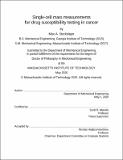Single-cell mass measurements for drug susceptibility testing in cancer
Author(s)
Stockslager, Max A.
Download1191718305-MIT.pdf (4.595Mb)
Alternative title
Single cell mass measurements for drug susceptibility testing in cancer
Other Contributors
Massachusetts Institute of Technology. Department of Mechanical Engineering.
Advisor
Scott R. Manalis.
Terms of use
Metadata
Show full item recordAbstract
Measuring the size distributions of micron-scale particles is of central importance in the biological sciences and for a wide range of industrial processes. The suspended microchannel resonator (SMR) is a sensor that measures the mass of individual micron-scale particles by detecting a shift in resonance frequency as particles flow through a hollow resonating micro-cantilever beam. While SMRs offer extreme precision for measuring mass, their applications have been limited by low measurement throughput. In the first part of this thesis, I describe several technical advancements aimed at increasing the throughput of SMRs. First, we developed devices containing many SMRs connected fluidically in parallel on the same microfluidic chip. By operating many mass sensors simultaneously, these "parallel SMR arrays" achieve approximately 27-fold higher throughput than previously possible. To further increase throughput, we developed a computational approach for resolving faster shifts in resonance frequency than previously possible using the resonator-phase-locked-loop coupled feedback systems. We describe in detail the operation and performance limitations of each technique. In the second part of this thesis, I discuss the application of SMRs for drug sensitivity testing in cancer. For most cancers there exists a long, growing list of FDA-approved chemotherapies and targeted agents, but often there is no rational basis to predict which drug will be most effective for a particular patient.. We have shown that in several cancers, tumor cell growth is altered upon ex vivo exposure to cancer therapeutics, and that changes in cell mass can be detected as a functional biomarker for drug sensitivity. In particular, we show in a retrospective clinical study that cell mass measurements predict the response of glioblastoma multiforme patients to temozolomide, a standard-of-care chemotherapy, and that the SMR drug sensitivity assay predicts the duration that patients survive on therapy better than the gold-standard genetic biomarkers. Looking forward, we envision that functional drug susceptibility testing will be useful for matching patients to effective therapies across a wide variety of cancers.
Description
Thesis: Ph. D., Massachusetts Institute of Technology, Department of Mechanical Engineering, May, 2020 Cataloged from the official PDF of thesis. Includes bibliographical references (pages 116-121).
Date issued
2020Department
Massachusetts Institute of Technology. Department of Mechanical EngineeringPublisher
Massachusetts Institute of Technology
Keywords
Mechanical Engineering.